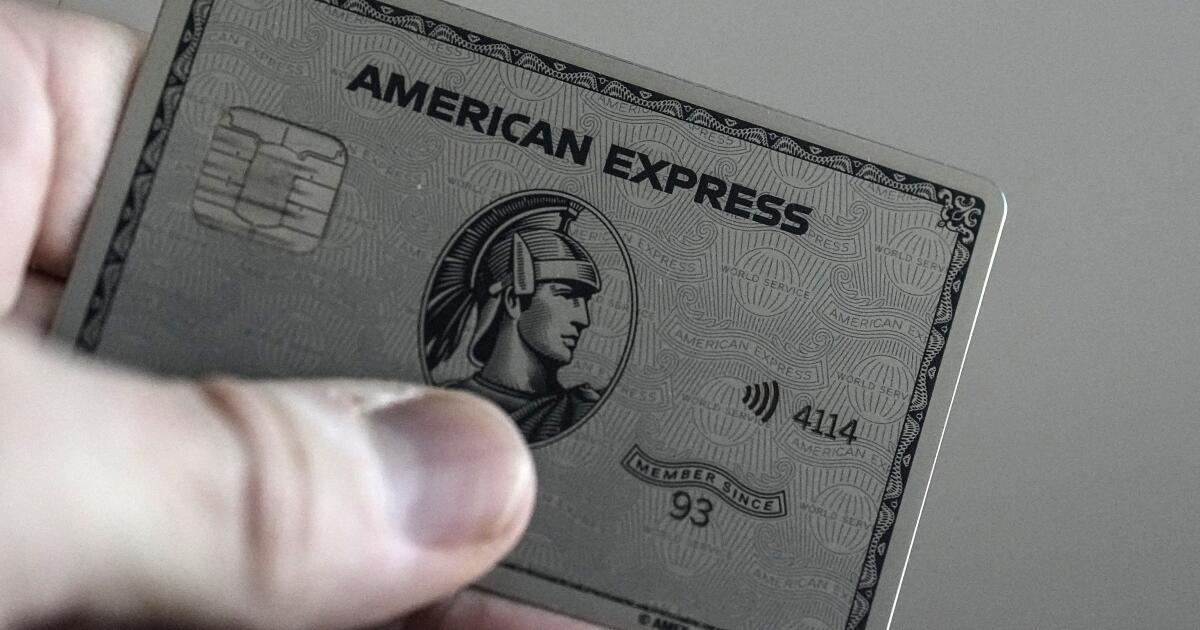NEW YORK –
Financial stress is on the rise for Americans who had no savings before the pandemic. Inflation, coupled with rising interest rates and the end of pandemic-related aid — such as suspending student loan payments — have caused historic credit card debt, experts say.
Americans racked up more than $1.05 trillion on their credit cards in the third quarter of 2023, and the average interest rate on a credit card is currently around 21.5%, the highest since the Federal Reserve began monitoring rates in 1994. A recent report from credit rating company Moody’s found that current credit card delinquencies far exceed 2019 levels.
Silvio Tavares, president and CEO of VantageScore, one of the country’s two largest credit rating systems, said: “The reality is that considerable signs of stress are beginning to show,” even though consumers report good health. financial, in general terms.
If you’re facing increased credit card debt while also feeling the effects of inflation, consider the following:
ASK FOR A REDUCTION IN YOUR INTEREST RATE One of the first things you should do is ask the company that issues your credit card to reduce their interest rates.
While the Federal Reserve indicated Wednesday that its first interest rate cut is likely to occur within several months, the average credit card interest rate is already considerably higher than what the Fed sets. Most of companies offer promotional rates and ways to move your balance to cards with lower interest rates, at least for the first year. These promotions can prevent your debt from accumulating.
That said, you will likely have to pay a balance transfer fee and pay off your balance before a certain promotion window ends, otherwise additional interest will accrue.
Furthermore, reports on banking industry perceptions show that banks are increasingly conservative when granting loans, which means it could be more difficult to refinance them.
LIQUIDATE YOUR HIGHEST INTEREST DEBT FIRST Known as “the avalanche approach,” paying off the debt that accrues interest the fastest will always be more efficient than starting with the lowest interest debt. This is the most sensible financial method to manage your debt.
Another strategy, known as the “snowball approach,” considers the psychological rewards of paying off smaller debts first, which can boost confidence, before starting on larger debts. Some financial advisors believe this method is more motivating.
You can find free counseling at the National Foundation for Credit Counseling at nfcc.org.
CONSOLIDATE YOUR LOANS AND LOWER YOUR STUDENT LOAN PAYMENT Advisors also encourage consumers to consolidate their loans with fixed rates, whenever available. The Federal Trade Commission’s consumer guide to paying off your debt can help you make a plan.
When it comes to student loan payments, make sure all of those debts are consolidated and that you’re taking advantage of any opportunity to lower your monthly cost.
The Public Service Loan Forgiveness (PSLF) program is one of several forgiveness alternatives still available to many student loan borrowers. Other sources for borrowers include: false certification, borrower defense, educational institution closure, total and permanent disability, as well as alternative compensation programs such as income-based repayment.
BUDGETING FOR INFLATIONWhile inflation is below its peak, the price of many goods and services remains high. A loaf of bread that cost $1.54 in December 2020 cost $2.02 at the end of last year, according to the Bureau of Labor Statistics. The average rent for a property with up to two bedrooms rose from $1,424 at the end of 2020 to $1,713 at the end of last year, according to realtor.com
America Saves, a nonprofit campaign of the Consumer Federation of America, also offers counseling.
Since the pandemic, some monthly service providers have been more open to negotiating their bills — whether it’s utilities, cable TV, phone, internet or auto insurance. Making these calls can result in significant savings, said Kia McCallister-Young, director of America Saves. Call for the lowest rate, rebates and coupons available, he advises. If a supplier competes with other companies, they are more likely to get a discount.
__
The Associated Press receives support from the Charles Schwab Foundation to produce educational and explanatory reporting that improves financial literacy. The independent foundation is autonomous from Charles Schwab and Co. Inc. The AP is solely responsible for its content.
2024-02-06 03:41:20
#Crucial #Time #Pay #Credit #Card #Debt
